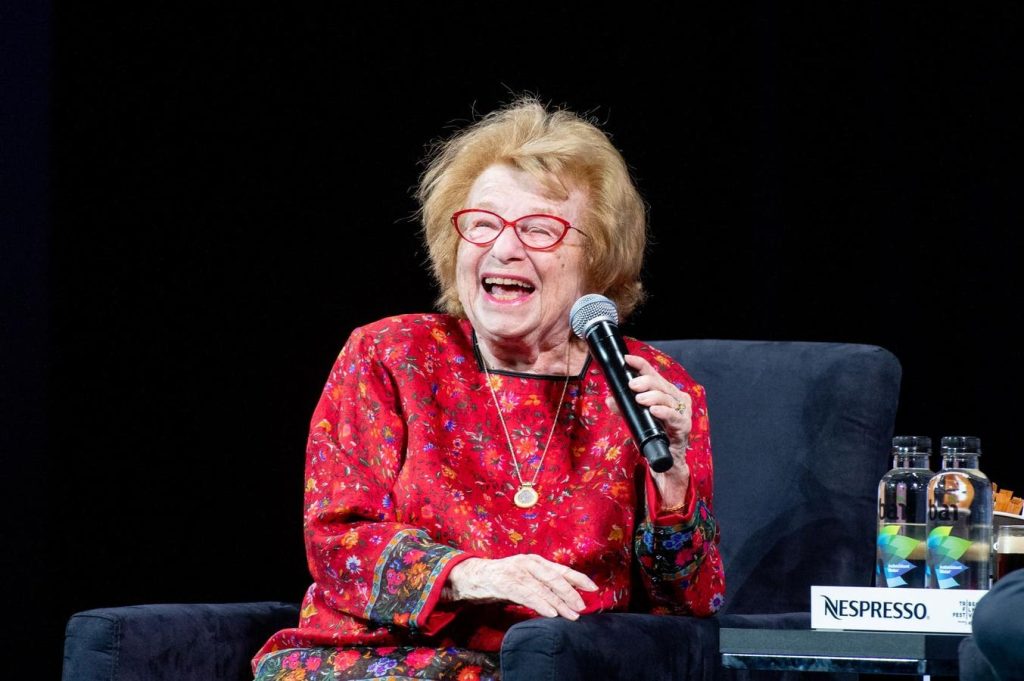For years, I have said that Dr. Ruth (Ruth Westheimer) is my role model. Dr. Ruth, sex therapist, professor, and author, spent her life educating people about sexual health. I heard Dr. Ruth speak in the early 1980s and again in 2014. In fact, I went to see the documentary, Ask Dr. Ruth twice because of my admiration for her as a person and for her work.
Though sex is a topic that inspires curiosity, questions, and confusion in people of all ages, in the 1980s no one was talking about it. Dr. Ruth sought to change that. She started her career at WYNY, the New York radio station where people would call in with questions about sex and relationships, and she would answer their questions by being honest, frank, and serious, but with a sense of humor that was magnetic.
In 1982, Dr. Ruth told Johnny Carson, “If we could bring about talking about sexual activity the way we talk about diet — the way we talk about food — without it having this kind of connotation that there’s something not right about it, then we would be a step further. But we have to do it with good taste.”
For decades, Dr. Ruth continued her mission to normalize conversations about sex so that people would feel comfortable talking about it. It was said she was “able to say words that no one else could say, talk about topics that no one else could talk about.”
I also wanted to talk about sex from a values-based perspective. When my sons were in high school, I helped teach a course in our church titled “Building Healthy Relationships.” We used a curriculum developed by the Presbyterian Church of America called “God’s Gift of Sexuality.” It was age-appropriate information to help youth make good decisions using correct information and based on their value system. Since schools can’t advocate a faith and spirituality perspective, we felt it was important for our youth to know how to build healthy relationships on faith-based values.
We included parents so they were aware of the messages being discussed. The curriculum covered anatomy because it is hard to talk about and understand sexuality without including body parts. We hired experts to facilitate difficult, uncomfortable, but appropriate and valuable conversations. Since my sons participated, I know the value of these workshops.
Without this training, young people tend to receive their bad information from “sleepovers” and friends. I discovered in my church that many parents still are not comfortable talking about sexual issues. In fact, I was asked to give talks in a couple of other churches about Building Healthy Relationships as a result of my involvement. I remember one parent saying, “My parents never told me anything about sexuality, so I don’t feel comfortable talking to my kids about it.”
My response was, “How do you feel about that? Wouldn’t you have appreciated some good information when you were their age?”
He agreed, and was almost in tears when he shared that he had to learn things the hard way when he was younger, and made mistakes he regretted. His experience is not uncommon, and goes to show that Dr. Ruth’s work is far from over.
At 96, Dr. Ruth was still writing and speaking. I plan to do the same about my own taboo topic: retirement. When it comes to retirement, people often don’t want to talk about it and are scared to even think about it. I wrote in a previous article about three reasons not to retire. We are not retiring from life, but we are moving onto something else and it takes time and intentional thought to move onto what’s next in life.
I’ve heard younger people often fantasize about what they will do when they retire. But many people approaching retirement age don’t want to talk about retirement and often don’t verbalize what they are thinking about it.
Yet, it is hard to be prepared for what’s next in life if you don’t even want to talk about it. How will you learn to navigate this time of life?
I was having a conversation with a corporate lawyer for a large insurance firm. She knew that I was passionate about helping people prepare emotionally for retirement. When I told her Dr. Ruth was my role model, she said, “I think you are onto something. Just like Dr. Ruth, you are talking about a topic that many of us want to avoid. People are scared to mention retirement in the workplace for fear they will be pushed out or slated for the next early retirement package.”
While it is common for organizations to bring in financial advisors to help people plan financially for retirement, most organizations do not prepare people for the nonfinancial aspects—emotional, physical, and spiritual changes—that take place. That leaves most people to figure everything else about retirement by themselves—which, like a lack of sex education, can lead to people making preventable mistakes, focusing on the wrong things, or not knowing what they are doing.
Similar to Dr. Ruth, I am honest and frank about life’s transitions and the aging process. I like to talk about death and dying. While our youth-centric society tends to market anti-aging products to address our external looks, I prefer focusing on the internal work needed to age gracefully and with wisdom.
Through education and conversations, I want to help people embrace, appreciate, and be grateful for every phase of their lives, and to live in the present without regretting the past or fearing the future.
We need to face the fact that 70 is not the new 50, and 60 is not the new 40, and 50 is not the new 30. Seventy is the new 70. I end each of my podcast interviews with my mantra and tagline: May the rest of life be the best of life.
Read the full article here













